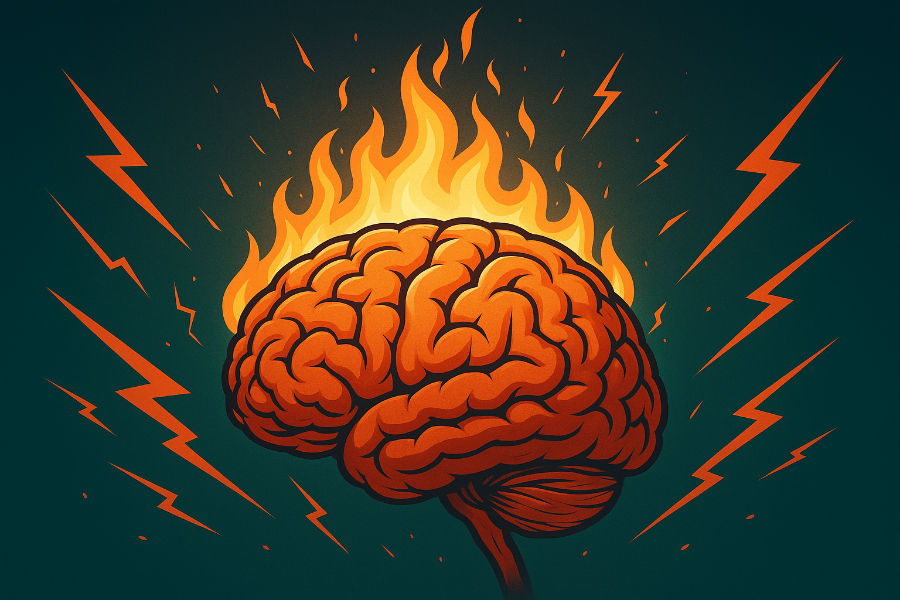Reboot Your Brain: 4 Science-Backed Ways to Beat Stress and Restore Focus
- Sep 8, 2025
- 4 min read
Updated: Sep 10, 2025

At the epicenter of the modern world, where the pressure for success is relentless, there's an undeniable truth hiding in plain sight: your mind is paying the price. Not in money, but in concentration and memory. It's not just that you feel overwhelmed; it's that your brain is being sabotaged by stress. This isn't just a self-help chat; this is hard neuroscience. It's the reality that millions of students and professionals in the United States are discovering: emotional well-being isn't an "extra"; it's the foundation of your success. The conversation has changed, and it's time for you to change with it.

The Brain in Emergency Mode: When the Mental Whiteboard Gets Wiped
Think of your working memory as the mental whiteboard where you jot down quick notes to solve a problem. It’s the space where you hold information needed for a class, a meeting, or a task. Science tells us this whiteboard has a limited capacity. It's a finite space, and stress essentially acts as a "thief," stealing that space for its own emergencies. The result? Mental fog, the inability to remember what you just read, and the frustrating feeling that your mind has simply shut down.
This phenomenon isn't a character flaw; it's a biological response. Your brain, in its ancient wisdom, has prioritized survival over solving equations. When we perceive a threat (an impending deadline, a demanding email from a boss), our brain activates the "fight or flight" mode, releasing hormones like cortisol. As Dr. Oliver Collins explains in his book The Brain on Stress, this process prepares the body for an emergency, but in doing so, it diverts resources from higher brain functions like concentration, critical thinking, and short-term memory.

It's Not Your Lack of Discipline, It's Your Biology: Lessons from Neuroscience
Perhaps you've blamed yourself for not being able to concentrate. You've thought, "If only I were more disciplined...". But science tells a different story. Dr. Daniel G. Amen, an expert who uses brain scans to map mental health, shows that anxiety and lack of concentration are directly linked to dysfunctional brain patterns. His philosophy, "Change your brain, change your life," is not a metaphor. It's the belief that by addressing the biological root of the problem, you can regain control.
The good news is that if stress can harm our cognitive function, we also have the power to heal our brain. The same neural networks that weaken with stress can be strengthened with conscious practice. Research from Yale Medicine has revealed a surprising finding: in some contexts, stress can even strengthen memory connections. While chronic stress is harmful, this finding underscores the incredible plasticity of our brain and its ability to adapt and heal.

From Confinement to Liberation: Beat Stress and Restore Focus
Neuroscience not only gives us the diagnosis, but it also offers a map for recovery. Here are some practical, science-backed techniques you can start using today to reclaim your concentration and memory:
Conscious Breathing: Cortisol can be counteracted with deep breathing. One minute of diaphragmatic breathing (inhaling slowly through the nose, exhaling through the mouth) is like a stop signal for your nervous system. It’s an anchor that brings you back to the present moment.
Intentional Movement: Physical exercise, even a 15-minute walk, is one of the most powerful antidotes to stress. Movement not only releases endorphins but also promotes the growth of new neurons in the hippocampus, a key region for memory.
The 20-Minute Rule: When you feel mental fog closing in, don't try to fight it. Take a break. Studies suggest that 20-minute breaks can reboot your brain and restore those valuable working memory resources. Use that time to walk, stretch, or simply sit in silence.
Disconnect to Connect: In a world of constant notifications, your brain is in a state of perpetual alert. Set clear boundaries with your technology. Turn off notifications while you study or work. This gives your brain the space it needs to focus on a single task, thereby improving the quality of your retention.
Success isn't just about working hard; it's about working smart by taking care of the most valuable instrument you have: your brain.
By implementing these strategies, you're not just relieving stress; you're investing in the architecture of your mind. You are strengthening the neural networks that will allow you to concentrate, remember information, and ultimately, reach your full potential. If this information resonated with you, share it. Help others discover that control over their success is closer than they think.
🔖 Key Takeaways
Stress is a Biological Saboteur: Lack of focus isn't a moral failing; it's a biological response. Stress triggers a "fight or flight" mode, releasing hormones like cortisol that divert resources away from higher brain functions, including working memory and concentration.
Your Brain is Plastic: Your brain can change and heal. The same neural networks weakened by stress can be strengthened through conscious practices and lifestyle changes.
Four Science-Backed Recovery Techniques:
Breathe Deeply: Counteract stress hormones instantly with a minute of deep, diaphragmatic breathing to calm your nervous system.
Move Your Body: Even a short 15-minute walk can release endorphins and help grow new neurons in the brain's memory center.
Take Strategic Breaks: When mental fog hits, take a 20-minute break. This can reset your brain and restore your limited working memory capacity.
Set Tech Boundaries: Turn off notifications while working or studying. This reduces perpetual alertness and allows your brain the space to achieve deep focus.
Invest in Your Mind: Success requires working smart, not just hard. Caring for your mental well-being is a direct investment in your cognitive architecture, allowing you to focus, remember, and perform at your best.







Comments